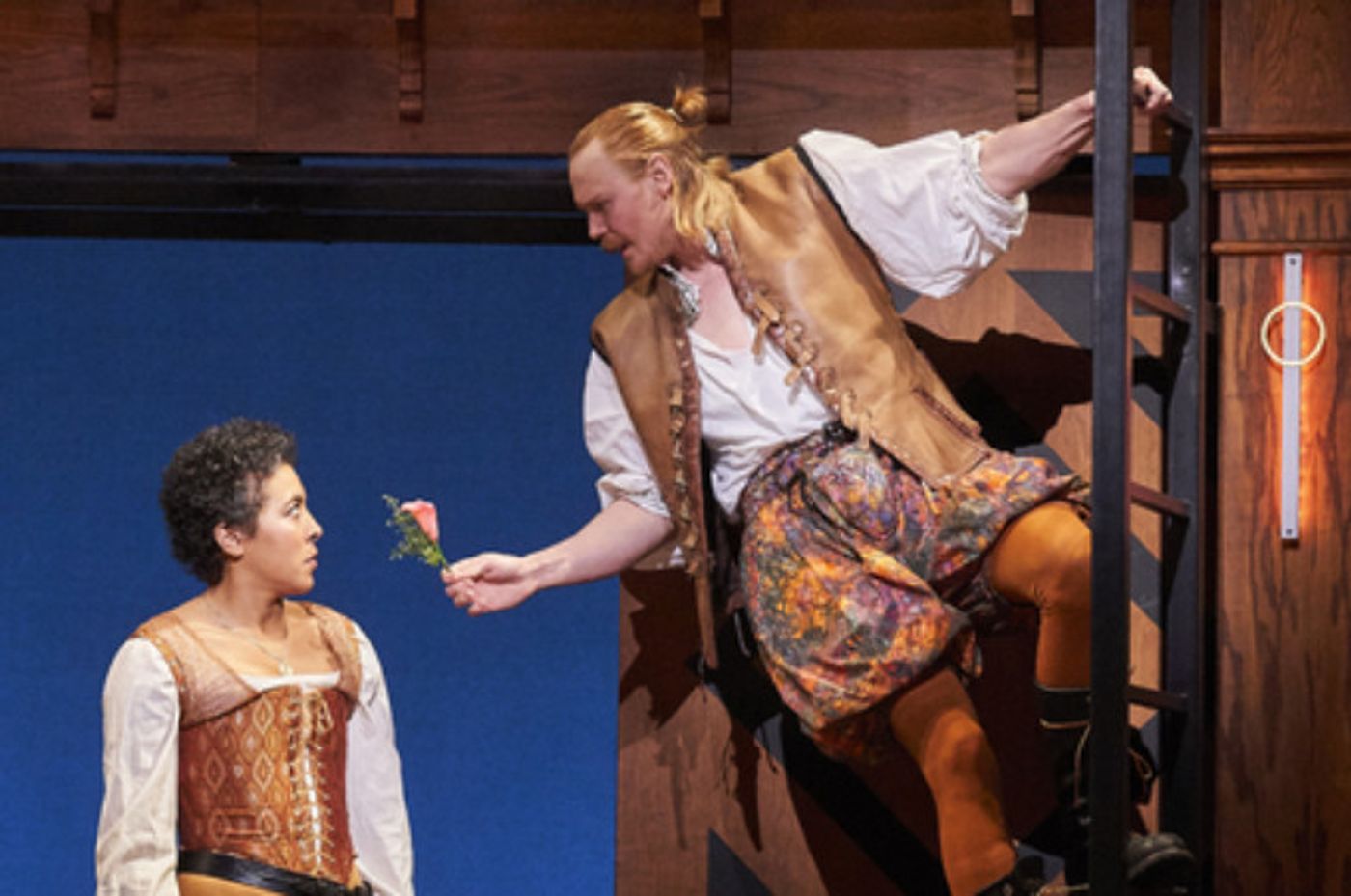Review: THE TAMING OF THE SHREW Is A Farcical, Thought-Provoking Delight At Great Lakes Theater

Most of Shakespeare's plays were written to be performed in The Globe Theatre. That performance space, a thrust stage, with a great number of the audience, the groundlings, stood around the stage, laughing, hollering insults at the actors, and having a heck of a good time during comedies.
Groundlings reveled in slapstick, prat-falls, cross-dressing, "shtick" and ridiculous characterizations.
They loved framing-story plays, a play with a story within a story, often numerous stories within stories. Plays with double-intendras, identity switches, coarse language and fantasies were prime.
Supposedly, "The Taming of the Shrew" was one of the audience favorites, and, we are led to believe, a favorite of the Bard, himself. Yes, William of Stratford seemingly loved a riotous, no-holds barred farce.
And, as the Sara Bruner directed version of "The Taming of the Shrew," now on stage at Great Lakes Theater illustrates, "Shrew," in the right production, is hysterically funny and a crowd pleaser.
"The Taming of the Shrew" interestingly is also one of Shakespeare's most controversial plays.
Controversial? It's a comedy. A farcical comedy, at that. It's intended to get laughter from the audience. To incite merriment. Yet, as a renowned Shakespearean scholar once wrote, "'Shrew"has elicited a panoply of ethically uneasy, or altogether disgusted responses to its rough-and-tumble treatment of the 'taming' of the 'cursed shrew' Katherine."
The followers of the "me too" movement are repulsed simply by the idea of Katherine, a woman, being "tamed" by her husband, a man. Many find the last speech of the play to be a symbol of all things wrong with male dominated societies. They find the references to Kate's sister, Bianca, as being the "ideal" woman equally repulsive. Bianca, the cute, petite, frilly-dress-wearing object of all men's desires, is not, in their minds, "ideal."
For those unfamiliar with the plot, the main story follows the courtship of Petruchio, a fortune-seeker, and Katherine, a headstrong and unwilling participant in the relationship. She is a "kind of" chattel, given to the first person who will take her off her father's hands and tame her.
Petruchio, through various psychological torments, including denying her food, trains her to be "desirable, compliant, and obedient." (Any "boos" from the reader, especially feminists and their supporters, would be appropriate here.)
Words matter, and Shakespeare's language, therefore, becomes the major theme, when the question of "taming" is referred to in the play.
First, Kate is initially described as a "shrew" because of her harsh language to those around her. Petruchio sets out to rid Kate of her strong, "manish" language. He uses terms to describe her which define her as "masculine," rather than "feminine and describes her as a possession: "my goods," "my chattels" and "my anything."
Then, there is Katherine's final speech in which she appears to have been "tamed" and has become compliant to her "master." If you take the words on face value, that's what it sounds like. However, if the words are considered sarcastic, given the idea that the "taming" is pretend, and she has duped Petruchio, then meaning changes greatly. Or, the speech could be considered as part of a play within the play, and, therefore, not be taken seriously.
Whatever, not only does the play delight, but can also inspire discussion.
Bruner has a long history with "Shrew." In high school, she relates in her playbill column, she "became enamored by the comedy and loved the feisty Kate." In her theatrical career she not only played Bianca and eventually, in the Great Lakes Theater's 2011 production, Kate.
Brunner's long experience with the Bard's script is apparent in her direction. She not only understands the nuances of the script but how to keynote them. The pacing is quick, the idea development clear.
In addition, she has a flair for farce. She seemingly understands that farce, exaggerated action, is best when it comes naturally. She has primed her performers so their exaggerations are in character and part of the action, not imposed upon the goings-on. They fit into the chaos like a well-made glove, not drawing attention to themselves, but being a natural part of the action.
The cast is excellent. Jessika D. Williams is a determined Kate, clearly knowing who she is and what she wants. This is a strong characterization, unlike many interpretations where a lovely actress feigns obstinence until she is "trained."
Jonathan Dyrud is not the usual handsome macho Petruchio. He of long hair and lanky body does not look nor act like the typical leading man. He adds a bit of whimsy to the role that adds to the merriment.
Mandie Jenson makes a lovely Bianca, Taha Mandviwala is fine as Lucentio, one of Bianca's lovers, and Lynn Robert Berg gets lots of laughs as the bow-legged elf-looking aged, Gremico.
Having audience members seated on the stage has become a "new" Great Lakes tradition, whether appropriate for the play or not. In this case, the "guests" are included in the action. In fact, one unsuspecting soul, who becomes a "sheriff" in the goings-on, gets included in the curtain call.
A large group of students from mid-Pennsylvania were present for the opening night performance. They laughed and clapped throughout the show. A lineman sized football player, was heard to say to his friends, "If that's what Shakespeare is about, I want to see more!" How do you like that Sarah Bruner?
CAPSULE JUDGEMENT: GLT's "Shrew" is a wonderful evening of the Bard at his finest, in a production that delights and, if you are also in the mood, illuminates the tale of conflicted love and the battle of men and women. Go! See! Enjoy!
The show runs through April 14, 2019 in the Hanna Theatre. Tickets can be ordered by calling 216-241-6000 or going to http://www.greatlakestheater.org/
Reader Reviews
Videos

